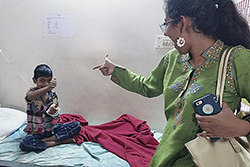While most teens were taking SAT exams and preparing for the winter theatrical productions at Floral Park Memorial High School, the Iftekhar sisters, Ameera, 16, and Simrohn, 14, were in Bangladesh, assisting with cleft palate surgeries for 47 children.
“The cleft palate causes medical problems and in society, its seen as a stigma,” said Simrohn. “Often [with a cleft palate] they can’t go to school or get a job and it often makes it harder for them to marry.”
According to New Jersey-based Smile Bangladesh, there are more than 300,000 unrepaired cleft lips and cleft palates in Bangladesh.
In 2009, the girls’ mother, Shehla Zamani Iftekhar, learned of the organization and began, with her daughters, raising money for Smile Bangladesh. Last summer, the Iftekhar sisters raised more than $5,000 for Smile Bangladesh, soliciting donations mostly from friends, family members and their parents’ coworkers. Ameera and Simrohn were invited by Smile Bangladesh to serve as youth representatives for this mission.
“I wanted my girls to know how much power they have as American citizens,” said Shehla. “They are privileged.”
After a 22-hour flight from New York to Bangladesh, including an additional hour-long flight and a two-hour bus ride to the Rev. Abdul Wadud Memorial Hospital in the Bengali port city of Khulna, the Smile Bangladesh crew arrived and immediately began their four-day mission.
For this set of surgeries, a crew of six anesthesiologists, 10 surgeons and four additional staff assisted with the 47 surgeries, from 6 a.m. to 10 p.m. each of the four days.
Ameera and Simrohn did not perform actual surgical procedures, but assisted the surgeons with the supplies and also provided moral support to the children and families of those who were receiving surgery. Their fluency in the Bengali language helps the two sisters explain procedures and after-care to the families of the cleft palate surgery recipients. In addition to English and Bengali, Ameera and Simrohn also know Urdu and some French and Spanish.

Ameera, Simrohn and Shehla would help the families understand the surgical procedure, translating information from the nurses and doctors to the families, helping them to understand the process and the recovery procedures. In addition to their translation assistance, they’d teach the mothers how to use the medicine, open safety tops, post-surgery nutrition and bandaging.
More than 80 percent of the patients awaiting surgery during this mission were under 13 years old, and some, babies, were only a few months old.
“They were all really cute,” said Simrohn. “I was just playing with them the whole time.”
Simrohn told of one patient, an 8-month-old baby named Rehan, who was the most serious case during this mission. His cleft palate was split so deeply that brain matter was herniated into its opening. The surgeons had to reconstruct his skull and a new palate. This proved to be their most extreme case because the surgical team was working without a neurosurgeon. The entirety of Rehan’s surgery was more than five hours, with minor complications following, including a fever, which was reportedly resolved before the team had departed the country.
Ameera explained that a regular obstacle of the surgery team is that resources in the remote locations are limited.
“The surgeons sometimes have to share resources with other parts of the hospital, like when we needed oxygen tanks, they were being used in another part of the hospital already,” she said.
Ameera noted that some of the equipment is from the 1970s, but the doctors and nurses make due with what they have available.
Across the dozens of surgeries, the quickest one lasted less than an hour, according to Ameera, and required only some simple stitching to correct the cleft palate. She told of one surgery, a 26-year-old woman, who was in love and engaged to be married. Her fiancé’s family had discouraged the man from marrying her because of her deformity, telling the man he should “marry a prettier wife.” The couple cried tears of joy after the simple cosmetic fix.
“It’s unfortunate because of their deformity; they are seen as outcasts because of it,” said Ameera. “The deformed palate causes trouble with chewing and breathing.”
In addition to the 47 surgeries, the Smile Bangaldesh team performed cosmetic follow-ups from its previous visit, last spring.
After their surgery assistance, Shehla arranged for a guide-led trip so Ameera and Simrohn could meet the teen girls of a local orphanage. They met nine girls, ranging in age from 12 to 15 years old, living at the orphanage. Many of the girls are the abandoned daughters of local prostitutes.
Ameera and Simrohn brought teddy bears and chocolates to the orphaned teens. Ameera also donated $41 to the orphaned teens, which she earned through some of her volunteer stipends.
This was the Iftekhars’ second overseas mission; the first was a mission to Pakistan to help orphans.
Ameera and Simrohn are equally involved here in Floral Park. The sisters are in honor society and are members of the high school’s Key Club and regularly add to their community service hours. Ameera volunteers at the Long Island Children’s Museum and is interested in attending medical school. Simrohn is on the school’s 2018 Student Board.
Over the years, in addition to collecting money, the Iftekhar girls have also collected stuffed animals and baby-sized blankets for the organization, which they still continue to do. Contact the Iftekhars by email at ishehla@gmail.com for information about their toy and blanket collection. You can also visit smilebangladesh.org for more information about the mission and making donations.


































